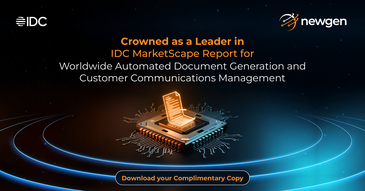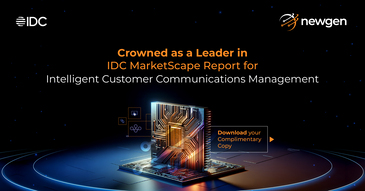How do organizations ensure fluent and personalized communications with customers across multi-channel? The key lies in CCM (Customer Communication Manager), which forms an essential system for organizations to control and optimize customer communications.
The Customer Communication Management market will reach $3.9 billion by 2031, growing at a CAGR of 10.7% from 2024 to 2031. As the world embraces digital means faster, the need for effective customer communication has become more crucial, and therefore, rapid adoption of CCM solutions is observed. Let us understand the CCM in detail.
Introduction to Customer Communications Management
Customer Communications Management refers to the collection of strategies and solutions that businesses use to compose, deliver, archive, and retrieve customer communications across multiple channels. The goal is to enhance customer experiences with timely, relevant, and personal communications through customer-preferred channels.
Today, as our digital age has evolved, competition in every business has increased to a high extent. So, the business owners must ensure that the communication with the customers is relevant and personalized to their preferences and context on a device of choice and demand. The ability to achieve such a level of personalization and relevance in communication is what a CCM platform does.
A quality CCM systemizes different technologies and processes involving content management, delivery systems, customer data management, and analytical tools in an integrated method to offer efficient customer communications with consistency across all aspects of a customer.
Importance of Customer Communication Management
Customer communications management (CCM) is not just a technological solution; it is a strategic approach that is extremely important for enterprise customers. The points below describe the importance of CCM for your business.
- Customer Expectations
Customers today desire continuity and personalization of communication. They need messages to be relevant but delivered in a manner that best suits them, whether via email, SMS, or even social media. CCM meets such expectations by tailoring all customer communications according to individual needs and delivered through preferred channels.
- Enhanced Customer Experience
Good communication is the backbone of any great customer experience. Using CCM, the enterprise can ensure that every detail—a bill, notification, or marketing message—is consistent, relevant, and timely to improve overall customer satisfaction.
- Operational Efficiency
CCM helps smooth communication processes by centralizing and automating the creation and delivery of customer messages. It reduces manual interference and errors, speeds up the process, and increases operational efficiency.
- Compliance and Risk Management
CCM, especially for industries like healthcare and finance, deals with strictly regulated industries. It embeds the regulatory requirements within the communication processes that help organizations manage their legal risks.
Key Benefits of Customer Communication Management (CCM)
You can get several benefits by establishing a fully functional CCM system. Some of them are listed below:
Improved Customer Experience
- Personalization: Customer data from various streams can be integrated into the CCM, which is why CCM solutions can enable highly personalized communications. Personalization goes beyond addressing customers by name—it involves customizing content for their behavior, preferences, and interactions with the brand.
- Consistency: Messaging through centralized CCM is consistent across all channels, which helps build trust and reliability. Additionally, consistent messaging enhances the customer experience by avoiding confusion and reinforcing brand identity.
- Interactivity: It enables modern CCM solutions to provide interactive content with dynamic elements, such as charts, graphs, and sliders. Since customers can engage fully with the messages, it will make the delivery of the process easier to interact with the users and ensure better interaction.
Increased Efficiency
- Centralization: CCM centralizes customer communications management and prevents departmental barriers to keep processes quick. This leads to faster content creation, more accessible updates, and lower operating costs.
- Automation: The CCM system frees up resources by automating routine tasks such as report creation, notification, and record updating. It also reduces human intervention, thereby increasing productivity.
Enhanced Compliance and Risk Management
- Regulatory Compliance: CCM solutions incorporate legal compliances within the communication process so that every type of communication meets legal standards. This leads to minimal chances of non-compliance that may incur legal consequences.
- CCM systems provide comprehensive records of all conversations, thus helping monitor modifications, handle permissions, and fulfill legal obligations.
Better Data Utilization
- Data Integration: The CCM solution integrates data from different systems and offers a complete overview of customer interactions. This integration enables companies to use data to develop more relevant and personalized communications.
- Analytics: The insight analytics provided within advanced CCM platforms enable an enterprise to understand customer behavior. This includes communication effectiveness and, in total, general aspects of engagement that will make businesses optimize communication.
Fundamentals of Customer Communication Management (CCM)
How do you ensure you choose the right CCM platform for your business? Here are four key considerations that should dictate your decision:
1. Choose a Unified Platform
Communication management tasks can be incredibly complex in today’s multi-channel, multi-product, high-speed, and customer-centric environment. With a unified CCM solution, managing communications becomes simpler, resulting in less complexity and cost in maintaining different systems. One must partner with a provider with similar domain experience to ensure a smooth transition to their new platform.
2. Prioritize Customer Experience
The success of any platform highly depends on the user experience. A smooth and intuitive GUI not only enhances user satisfaction but can also expedite employee onboarding and productivity. When evaluating a CCM platform, ensure its design is user-friendly with seamless navigation that minimizes your team’s learning curve.
3. Empower Your Business Users
With businesses converting to digital leadership, it is vital to transfer the control of communications from IT to business users. The CCM platform allows business users to handle content independently and helps in collaboration, agility, and responsiveness, bringing the communication strategy in tune with customer needs.
4. Focus on Scalable Architecture
A well-architected CCM platform integrates legacy and modern systems across an organization for consistent communication across channels. Look for a flexible platform with seamless integration facilities. It should allow data-driven personalization and adapt to the ever-changing communication methods effectively in the long run.
How to Get Started in Customer Communication Management
Incorporating CCM into your business will ensure a great customer experience; it is an automated system. While choosing your CCM, you must select the correct one and utilize it best. The steps to consider include:
1. Assess Your Needs
- Identify Communication Channels: Identify your organization’s different communication channels and the extent to which integration with your existing systems is required. The assessment will help you develop the proper CCM solution for your needs.
- Set Objectives: Clearly define what you want to achieve using the CCM. The objectives can range from enhancing customer experiences and efficiency to attaining compliance.
Select the Right CCM Solution
- Research Vendors: You must research different vendors and compare them, considering their capability, integration options, and customer support. Out of these, look for solutions that can provide one platform from which many capabilities can be delivered through user-friendly interfaces with flexibility in deployment options.
- Consider Scalability: Find a CCM solution that will grow with your business and meet your changing communication needs.
3. Plan for Integration
- Integration with current systems: CCM’s components must integrate with the existing IT setup, which includes CRM, ERP, and digital asset management systems.
- Data Migration: Plan for data migration to ensure that all relevant customer data must migrate to the new CCM set-up with complete accuracy.
4. Implement and Train
- Rollout Plan: Document a rollout plan for implementing the CCM solution, including timelines, milestones, and resource allocation.
- Training: Train your team to familiarize themselves with the CCM platform and its features. The training should include creating, managing, and reporting on content.
5. Monitor and Optimize
- Monitor Performance: Regularly check the performance of the CCM system to see if it is meeting the project objectives. Use analytics tools to track the effectiveness of communication and customer engagement.
- Optimize CCM strategy: Always optimize your CCM strategy using performance data and feedback to achieve better overall effectiveness in customer communications.
CCM vs. CRM
Even though CCM and CRM are two ways to better customer interactions, they differ in their purpose and functionality. Here is how both differ from each other:
| Basis | Customer Communication Management (CCM) | Customer Relationship Management (CRM) |
|---|---|---|
| Focus | Manages outbound communications across channels. | Manages customer relationships and interactions. |
| Functionality | Creates and delivers personalized messages (emails, SMS, etc.). | Tracks customer data, interactions, and sales processes. |
| Integration | Integrates with CRM, ERP, and other systems for consistency. | Integrates with tools for data management, sales, and marketing. |
| Data Utilization | Personalizes communications using customer data. | Analyzes customer behavior and preferences for better management. |
| Objective | Ensures timely, relevant, and consistent communications. | Maximizes sales, enhances relationships, and improves service. |
How does Newgen Solutions help with the CCM implementation?
The NewgenONE OmniOMS Omni Channel Customer Engagement platform from Newgen heralds a sea change in Customer Communication Management through a robust and integrated solution crafted to optimize customer interactions. Advanced functionality ensures frictionless customer communication, maximum customer experience, and regulatory compliance.
- Ease of Deployment: Being cloud-friendly and supported by Docker, deployments will be much easier and seamless with no recorded downtime, ensuring your CCM processes are genuinely efficient and uninterrupted.
- Seamless Communication Integration: The comprehensive ecosystem of integrations backed up by ‘cloud-ready’ APIs will ensure seamless information exchange across disparate systems. This would, therefore, enable interaction with customers through their preferred digital channels, further improving the efficiency of communication processes.
- Scalability and Compliance: NewgenONE’s cloud-based architecture scales up volume-wise, ensuring that all regulatory and data protection requirements are met. Communications are auto-archived, and real-time reports are created. The system logs all the details for audit and compliance purposes.
- Easy Template Design: With NewgenONE Software’s intuitive templates, you can drive engaging customer communications. You can take these templates and set up configurations that will work for your brand while keeping messaging secure and compliant.
Conclusion
Customer Communication Management (CCM) is an essential means through which modern businesses interact with their customers effectively, personalized, and consistently. Enterprises use CCM tools to enhance communication and customer satisfaction while sustaining compliance across multiple contacts. A successful CCM will not only smooth out the communication process but also build better relationships with customers.
Are you ready to transform the way your business communicates with its customers? Learn how NewgenONE enterprise-grade Customer Communications Management solutions will upgrade your customer experience and drive your goals. Request a demo today and see how our platform can meet your unique needs and drive extraordinary results!
You might be interested in


09 Jan, 2025
Analyst Report: Newgen Recognized as a ‘Leader’ in the IDC MarketScape for Automated Document Generation and Customer Communication Management

07 Jan, 2025
Analyst Report: Newgen Recognized as a ‘Leader’ in IDC MarketScape Report for Intelligent CCM

